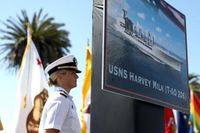On June 3, 2025, Defense Secretary Pete Hegseth ordered the U.S. Navy to rename the USNS Harvey Milk, a John Lewis-class fleet oiler named after the pioneering gay rights activist and Navy veteran. This rare move, coinciding with Pride Month, underscores the military's ongoing effort to scale back diversity, equity, and inclusion (DEI) initiatives, marking a significant shift in the Pentagon's cultural policies.
The USNS Harvey Milk, a 742-foot replenishment oiler designed to provide at-sea fuel and supplies to Navy vessels, was delivered to the Navy in 2023. It carries approximately 157,000 barrels of oil, along with diesel fuel, lubricating oil, and other provisions essential for naval operations. The ship is part of a broader program consisting of 20 planned vessels, with General Dynamics NASSCO holding contracts for 17 of these ships. The contract, expanded in September 2024, is valued at over $6.7 billion.
Named in 2016 by then-Navy Secretary Ray Mabus, the John Lewis-class oilers honor civil and human rights leaders, with sister ships bearing names such as USNS John Lewis, USNS Earl Warren, and USNS Robert F. Kennedy. The decision to name a ship after Harvey Milk was a recognition of his legacy as one of the first openly gay elected officials in the United States and his service as a Navy operations officer during the Korean War.
Harvey Milk’s story is emblematic of courage and resilience. Serving four years in the Navy aboard the USS Chanticleer and USS Kittiwake rescue submarines, Milk was forced out and given an "other than honorable" discharge after being questioned about his sexual orientation. He later emerged as a key LGBTQ+ advocate and was elected to the San Francisco Board of Supervisors in 1977. Milk sponsored groundbreaking legislation banning discrimination based on sexual orientation in public accommodations, housing, and employment—a bill that was signed into law by Mayor George Moscone. Tragically, both Milk and Moscone were assassinated less than a year later by Dan White, a disgruntled former city supervisor.
According to Pentagon spokesman Sean Parnell, "Secretary Hegseth is committed to ensuring that the names attached to all DOD installations and assets are reflective of the Commander-in-Chief’s priorities, our nation’s history, and the warrior ethos." Parnell emphasized that any potential renaming would be announced after internal reviews are complete.
While the timing of the renaming order during Pride Month was reported by ABC News as intentional, the Navy has yet to announce a new name for the USNS Harvey Milk. Military.com cited an internal memorandum from the Office of the Secretary of the Navy, revealing that Navy Secretary John Phelan assembled a small team to oversee the renaming process, with a new designation expected within June 2025.
This decision is part of a broader campaign led by Hegseth and aligned with former President Donald Trump's objectives to "re-establish the warrior culture" within the military. The move includes a purge of DEI references across programs, policies, books, and social media, coinciding with the Pentagon’s efforts to remove transgender troops from service.
The USNS Harvey Milk is not alone in facing renaming considerations. CBS News reported that several other Navy vessels named after civil rights and social justice figures—such as the USNS Thurgood Marshall, USNS Ruth Bader Ginsburg, USNS Harriet Tubman, USNS Dolores Huerta, USNS Lucy Stone, USNS Cesar Chavez, and USNS Medgar Evers—are also under review for potential renaming.
These actions follow a pattern established earlier in 2025 when Hegseth renamed Fort Moore back to Fort Benning, reverting to its original designation that honored a World War I Army soldier, Corporal Fred G. Benning, rather than the Vietnam War veteran Lt. Gen. Hal Moore. This renaming circumvented laws barring military honors for Confederate generals, as Fort Benning was originally named after Confederate General Henry Benning in the 1920s. Hegseth had previously criticized such renamings as "a sham" and "crap."
The renaming of Navy ships is a rare and significant event, steeped in maritime tradition. Changing a vessel's name is often viewed as bad luck, tempting retribution from the sea gods. Despite this, the Biden administration also engaged in renaming efforts in 2023, changing the USS Chancellorsville—named after a Civil War battle—to the USS Robert Smalls, honoring a sailor and former enslaved person. Similarly, the USNS Maury, originally named for a Confederate sailor, was renamed the USNS Marie Tharp, after a pioneering geologist and oceanographic cartographer.
The USNS Harvey Milk was christened in 2021, with then-Navy Secretary Carlos Del Toro highlighting the event as an effort not only to amend past wrongs but also to inspire LGBTQ community leaders serving in the Navy and beyond. The ship is operated by the Military Sealift Command and crewed by approximately 125 civilian mariners. It completed its first resupply mission at sea in fall 2024 near the Virginia Capes and continued operations off the East Coast until entering scheduled maintenance earlier this year at the Alabama Shipyard in Mobile.
The renaming has drawn sharp criticism from prominent political figures. Former House Speaker Nancy Pelosi condemned the move as a "spiteful" act that undermines national security and the warrior ethos, calling it "a surrender of a fundamental American value: to honor the legacy of those who worked to build a better country." California Governor Gavin Newsom echoed this sentiment, emphasizing Milk’s status as a Korean War combat veteran whom his commander described as "outstanding." Newsom stated, "Stripping his name from a Navy ship won’t erase his legacy as an American icon, but it does reveal Trump’s contempt for the very values our veterans fight to protect." He expressed his views on the social media platform X.
As the Navy moves forward with the renaming process, the legacy of Harvey Milk—as a trailblazer for LGBTQ rights and a dedicated serviceman—remains firmly etched in American history. While the ship’s name may change, Milk’s impact on civil rights and military service endures.



